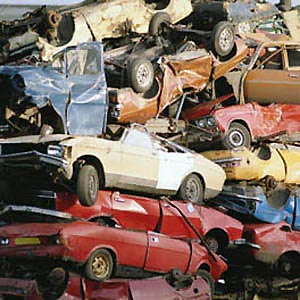As new, more-efficient cars become available, older models must eventually be taken off the road for a genuine reduction in greenhouse-gas emissions to occur.
Yet while U.S. consumers are purchasing plenty of those new cars, they're still keeping the old ones around.
The number of cars on U.S. roads is now at a record high, according to research firm IHS Automotive (via The Car Connection).
IHS data shows roughly 252,700,000 light-duty cars and trucks in operation in the U.S.--the highest total ever.

Clunkers
Of that number, fully 3.7 million have been added since July 2013, representing a 1.5-percent growth rate. That rate of expansion hasn't been seen in almost a decade, since the 2004-2005 period.
Meanwhile, fewer cars are being scrapped.
Roughly 11.5 million vehicles were taken off the road in 2013, compared to a record high of 14 million in 2012.
The current situation stands in contrast to the U.S. car fleet of 2010, which shrank as the country started to climb out of the depths of the "Great Recession."
But it's likely the after-effects of that economic downturn are still convincing some owners to put off new-car purchases.
Significant improvements in reliability over the past decade or so have also made regular trade-ins less necessary, and raised the average age of cars on U.S. roads to an historic high.
The average car in the U.S. today is a remarkable 11.4 years old--the highest age in 70 years, since World War II halted all U.S. car production for four years--and it's expected to rise to 11.5 years by 2017, and increase further to 11.7 years by 2019.
IHS suggests that only robust new-car sales are keeping that average age from rising even faster. (Data shows, however, that the newest car in any household covers the most miles per year, with a vehicle's annual miles driven falling as it ages.)
And, the institute expects the average age of cars on the road to skyrocket as more electric cars hit the road.
Their lack of an internal-combustion engine, gearbox, and other associated hardware means far less required maintenance--and fewer parts that could potentially break.
_______________________________________________












